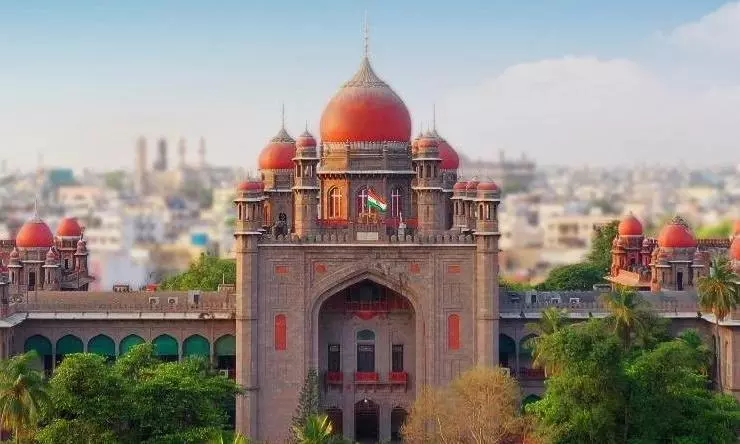HC upholds death for 5 convicts
Court rules in favour of special NIA court’s findings against 2013 Dilsukhnagar twin blast convicts

Hyderabad:Calling the terror attack ‘rarest of rare’ cases and taking note of its cold-blooded nature in an urban area teeming with people, of lives extinguished and families broken, the Telangana High Court on Tuesday upheld the death penalty imposed by a special court on five convicts for the February 2013 twin bomb blasts at Dilsukhnagar, in which 18 persons, including an infant, were killed and 131 injured.
A division bench of Justice K. Lakshman and Justice P. Sree Sudha confirmed the death penalty imposed by National Investigation Authority (NIA) special court and dismissed the criminal appeal filed by the convicts. “With unassailable certainty we believe that such an act of terror so deliberate, so devastating transcends the pale of routine adjudication, compels the ‘rarest of rare’,” Justice Lakshman said.
Outside the court, celebrations broke out and people at the site of the blasts in Dilsukhnagar celebrated sweets. The verdict came a decade after the blasts.
The criminal appeals were filed by Asasdullah Akther Haddi Tabrez Danial Asad, Zia Ur Rehman Wagas Javed Ahmed Nabeel Ahmed, Mohd Tahseen Akthar Hassan Monu, Yasin Bhaktal Shahrukh and Ajaz Shaikkhsamar Arman Sayeed Shaik.
The referred trial was based on letter addressed by the trial court (the NIA special court) to the High Court seeking confirmation of capital punishment of death under Section 366 of the CrPC, which mandates that when a sessions court passes a death sentence, the proceedings must be submitted to the High Court for confirmation. The sentence cannot be executed unless confirmed by the High Court.
In its decision, the High Court opined that there was no error in the trial court order for the reason that the crime fells under the ‘rarest of rare’ cases.
The High Court observed: ‘On consideration of the gravity of offence, motive, socially abhorrent nature of the accused, conspiracy and the manner in which the offence was committed, the trial court rightly imposed the punishment of death penalty on the accused, holding that it is a rarest of rare case.”
The trial court had considered the submission of the prosecution, which examined 157 witnesses and exhibited around 507 documents. The accused did not examine any witness. However, they exhibited 40 documents, which were relevant portions of statements under Section 161 of CrPC, IP addresses, details of mails etc.
During the trial, counsels for appellants argued that there were procedural lapses in the investigation like delay in registration of the FIR, seizure procedure not being followed, FSL experts not being examined, test identification parade not being conducted properly and others.
The High Court made it clear that in a this type of organised crime, the accused could not take faulty/defective investigation as a defence and seek acquittal.
Justice Lakshman observed that the scale of destruction, both immediate and enduring, elevated this offense beyond conventional criminality, placing it in a realm where ordinary punishment falters.
The judge stated: “The gravity of this crime lies not merely in its physical toll but in its audacious, unpardonable challenge to the sovereign integrity of the State.”
“With unassailable certainty we believe that such an act of terror so deliberate, so devastating transcends the pale of routine adjudication, compels the ‘rarest of rare’.”
The court also pointed out that the factual matrix was stark, unyielding, and demanded unflinching attention. The convicts, propelled by a calculated design to destabilise the social order, executed a meticulously planned attack upon a bustling urban locale, a place of confluence for innocent civilians — men, women, and children untainted by any conflict.
“This was no spontaneous outburst; it was a cold-blooded conspiracy, marked by the deployment of sophisticated explosives, synchronised detonations, and a strategic selection of targets to maximize carnage and despair.”
The court said that the toll was staggering: lives extinguished, families irreparably broken, and a pervasive sense of insecurity etched into the national consciousness.
Justice Lakshman said that when terror bombings strike with calculated ferocity at innocent civilians, the death penalty emerged as the only sanction capable of matching the crime’s existential threat. “When an offence is not merely a crime against individuals but an assault on civil order itself, the weight of justice must correspond unflinchingly to the enormity of the transgression.”
“This attack on Hyderabad, deliberately targeting civilians in busy streets with a series of coordinated bombings, represents an act that transcends ordinary criminality,” Justice Lakshman said. “The destruction it wrought, the lives it claimed, and the terror it instilled place it in a category beyond conventional crime. The attack was not an impulsive act but the product of an extensive conspiracy, executed with precision and supported by a network of external actors. Every stage, from training to execution, was marked by calculated intent.”
After perusing the report submitted by the two mitigators, who were appointed by the High Court to assess the conduct and behavior of the convicts, who are in the prison and their psychological evaluations, the court found that there is absolutely no chance of reformation or rehabilitation of the convicts.
Life imprisonment would be completely futile since the sentencing aim of reformation is completely unachievable. Having given due consideration to all the aggravating and mitigating circumstances, we are of the firm view that this is a fit case wherein the death penalty awarded by the Sessions Court needs to be confirmed, Justice Lakshman said .
The High Court also pointed out that the appellants ( convicts) failed to make out any case warranting interference by the High Court to set aside the conviction judgment passed by the Trial court and Criminal Appeal fails and the same is liable to be dismissed. However, the convicts are informed about their right to prefer an appeal before the Supreme Court within thirty days. The court directed the authorities to supply a certified copy of the judgment to the convicts, immediately at free of cost.

